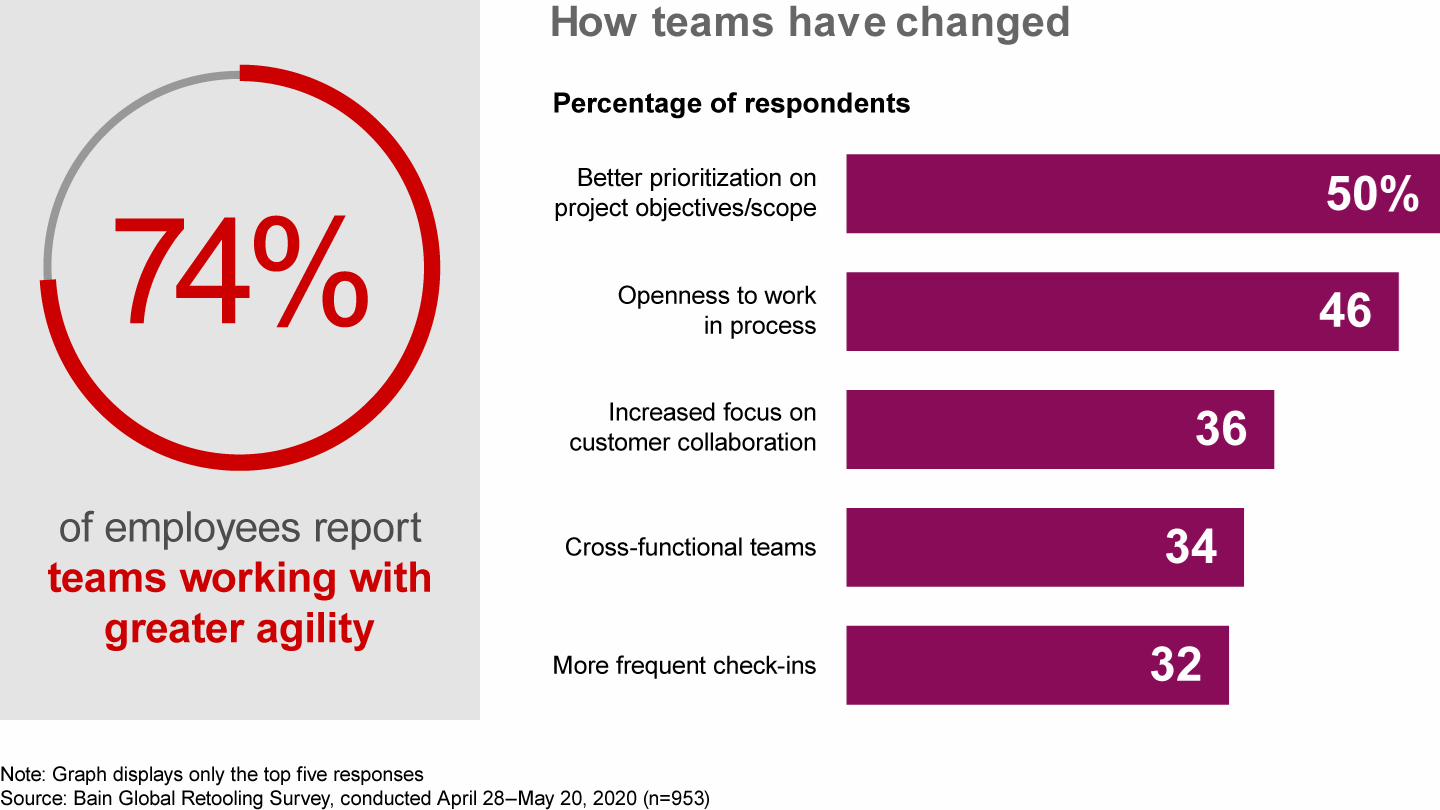Article

Organizations are like a rubber band. Their people can stretch when needed, but unless the organization itself fundamentally changes, after a period of time it’s going to snap back to its previous form.
Several months into the Covid-19 crisis, executives are confronting this very challenge as they seek to reshape their organizations and make recent positive changes permanent. Since the pandemic struck, the strength and resiliency of the human spirit have been on display in communities across the globe, and in business too. Our recent survey of nearly 1,000 white-collar workers found the large majority were proud of how their company has met Covid-19 and supported employees, customers and their communities.
This extraordinary corporate response in the face of crisis happened because individuals fundamentally transformed how they work. They have been bold, creative and committed, helping their organizations get through the initial, acute phase of the pandemic. The crisis is far from over, however, and it won’t be our last. So companies are now adjusting to a new normal in which adverse events—whether social unrest, trade wars, natural disasters, data breaches or any number of other possibilities—are all too common.

Macro Surveillance Platform
For more detail on the business implications of coronavirus from Bain’s Macro Trends Group, log on to the Macro Surveillance Platform. Learn more about the platform >
To thrive in this era of unpredictable and accelerating change, businesses will need an unprecedented amount of flexibility and agility. One way they are developing those characteristics is by carefully studying their pandemic response, looking for clues as to what they might start, stop or continue.
Consider the Covid-19 experience of one personal care company. Its employees have achieved remarkable results this year by breaking down barriers, working around old processes and focusing on simply getting things done. Among their accomplishments:
- Designing and manufacturing a new consumer product line in just seven weeks. (This process typically takes 9 to 12 months.)
- Launching in just three weeks a digital site that provides access to scarce products to customers in need, an effort that would have taken months during normal times.
- Rapidly reducing the number of SKUs produced in order to increase by over 30% their capacity to manufacture the most-needed products and address shortages.
How was this possible? Employees noticed, among other things, that out of necessity they were more willing to move fast, take smart risks and learn from mistakes, and that their leaders supported them doing so. One employee noted, “Mistakes are made, but it’s okay because the leaders are supportive and reaffirm it’s all about the next thing. That behavior emboldens people and makes them feel safe and able to make decisions.”
So how does an organization looking to maintain its momentum permanently reshape the rubber band?
The CEO of the personal care company is emphasizing how its disaster response can become the basis of greater ongoing speed, flexibility and resilience. As one member of the executive team noted, in its early response to Covid-19, “We acted like the company we want to be.” To avoid backsliding, and really build this into the company’s DNA, the executive team is codifying the culture that was revealed during Covid-19 into the company’s redefined purpose, values and behaviors.
In fact, many companies have adopted agile techniques since the onset of Covid-19 as a mechanism to enable flexibility and resilience (see Figure 1). Sporadic agile can be exhausting, however, so as a next step, companies are increasing their formal training of agile teams in order to preserve some of the magic but avoid burnout.
Since Covid-19, corporate teams have become more agile


When the urgency of the crisis fades, companies can continue to nurture a growth mindset to reinforce their newfound agility. As explained by Stanford psychologist Carol Dweck, individuals with a growth mindset thrive on challenge and see failure not as a lack of intelligence but as a springboard for growth, a chance to stretch their existing abilities.
Those with a fixed mindset, by contrast, assume character, intelligence and creative ability can’t be changed in any meaningful way. To them, failure is shameful, and therefore challenges are something to be avoided. During Covid-19, employees have displayed a growth mindset, taking risks, learning from failure and ultimately succeeding because they had to. To maintain a growth mindset in the long run, companies can celebrate and support this shift in behavior.
While 74% of employees report that they have been working in more agile ways since the disaster struck, many worry the new ways of working will be difficult to maintain, threatened by a declining sense of urgency, among other reasons. The fear of a reverse migration is real. Employees are energized and acting differently today, but organizations, like rubber bands, will snap back if their executive teams don’t reshape their operating models to focus on resilience, growth and learning, embracing and nurturing these “new” employees.
Support your people’s transformation and you will get through the crisis, but fail to change your organization, and the old ways of working will snap right back.

Coronavirus
The global Covid-19 pandemic has extracted a terrible human toll and spurred sweeping changes in the world economy. Across industries, executives have begun reassessing their strategies and repositioning their companies to thrive now and in the world beyond coronavirus.